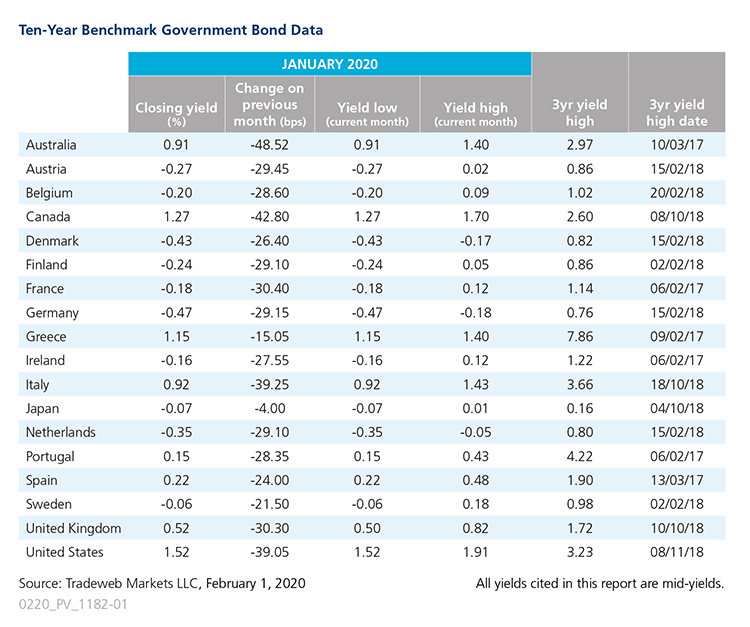Tradeweb Government Bond Update - January 2020
In a month filled with central bank decisions and notable political events, yields on 10-year benchmark bonds fell in January across sovereign bond markets. The biggest move came from Australia’s 10-year note, whose mid-yield plunged 48.5 basis points to finish January at 0.91%. Despite the economic disruption caused by the country’s bushfires, the Reserve Bank of Australia left the cash target rate at 0.75%, following three prior cuts in 2019.
Canada’s 10-year government bond yield experienced the second largest drop, ending the month nearly 43 basis points lower at 1.27%. The Bank of Canada maintained its overnight rate target at 1.75%, where it has stayed since October 2018. The central bank noted that while business investment had a “strong” third quarter in 2019, hiring had slowed with “unexpectedly soft” consumer confidence and spending indicators. It also reduced its growth forecast for the fourth quarter to an annual rate of 0.3%, but said that the economy would expand by 1.6% in the coming year.
Significant moves were also on display throughout Europe. The yield on Italy’s 10-year benchmark bond tumbled 39 basis points to close the month at 0.92%, while its French equivalent declined 30 basis points to -0.18%. Meanwhile, Germany’s 10-year Bund saw its yield drop 29 basis points to finish at -0.47%. After keeping monetary policy unchanged at its January meeting, ECB President Christine Lagarde indicated that negative interest rates would stay in place for some time. The current deposit rate is -0.5%.
In the U.S., the 10-year Treasury yield dipped 39 basis points to end January at 1.52%. The Federal Reserve left the target range for its benchmark interest rate unchanged at 1.50 - 1.75%, with Chairman Jerome Powell citing stabilizing growth and reduced uncertainty around trade. While his statement did not describe any immediate changes to the Fed’s USD 60 billion monthly Treasury bill purchases, he said it would scale back that amount later this year.
Elsewhere, the UK’s 10-year Gilt yield fell by 30 basis points to 0.52%, as the country prepared to formally exit the European Union on January 31, despite uncertainty around trade agreements and financial market access. Falling the least among its counterparts, the yield on Japan’s 10-year benchmark note dropped four basis points to -0.07%. The Bank of Japan kept its interest rates and asset purchase targets unchanged, but raised growth projections.